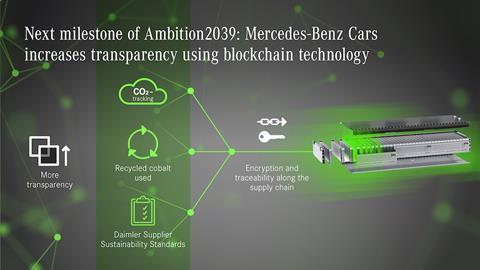Mercedes-Benz Cars has launched a pilot project to improve transparency on how much CO2 is emitted in the transport of source materials, starting with recycled cobalt.

The trial will extend the company’s existing use of blockchain technology by tracking climate-relevant gases and other material along battery cell manufacturers’ supply chains, giving greater weight to carbon dioxide savings and proof of environmentally sustainable handling of resources in procurement.
The information gathered will also show whether sustainability standards related to working conditions, human rights, environmental protection, safety, business ethics and compliance are being passed on down to all companies involved, as required by parent group Daimler.
“With the pilot project, Mercedes-Benz is driving transparency in the supply chain beyond the direct contractual partners,” stated the German OEM, arguing suppliers and partners play a key role in implementation of its sustainability business strategy because they significantly contribute to value creation.
In parallel with recording emissions data, Mercedes-Benz Cars is conducting workshops with suppliers to identify effective CO2 reduction measures. The work is part of Mercedes-Benz Cars’ Ambition2039 programme which aims for a carbon-neutral new passenger car fleet in less than 20 years.
“This transformation requires detailed knowledge of all climate-relevant processes associated with the entire vehicle value chain. That is why in a first step Mercedes-Benz is creating transparency of CO2 emissions and the use of secondary material in the supply chain,” stated the Stuttgart-headquartered company.
Markus Schäfer, management board member of Daimler and Mercedes-Benz responsible for group research and Mercedes-Benz Cars’ development, procurement and supplier quality, said: “With Ambition2039, Mercedes-Benz Cars has set itself high goals. We can only get there in close cooperation with our suppliers…[.]
“We are the first manufacturer to use blockchain technology to map CO2 emissions in the global battery cell supply chain. In doing so, we are laying the cornerstone for effective improvements, for the environment and for our businesses.”
The project is being conducted in partnership with a battery cell manufacturer and British start-up Circulor, which specialises in using blockchain technology and artificial intelligence to verify responsible sourcing of raw materials to underpin effective recycling.
The blockchain-based system maps the production flow of materials as well as associated CO2 emissions.
Mercedes-Benz says blockchain technology offers numerous advantages, such as linking digital data records through encodings that cannot be altered unnoticed. All supply chain participants can trace integration, transmission and confirmation of information at any time while confidential information remains protected.
“This is of particular relevance for complex and highly dynamic global supply chains, such as in battery cell production,” the carmaker said.
Last year it commissioned development of a supply chain blockchain prototype to provide consistent and transparent documentation of contracts across all tiers. The insights gained are being incorporated into the new project. The work will initially concentrate on materials, the production of which is particularly carbon intensive, such as steel and aluminium, as well as battery cells.

























![Global[1]](https://d3n5uof8vony13.cloudfront.net/Pictures/web/a/d/s/global1_726550.svgz)











No comments yet